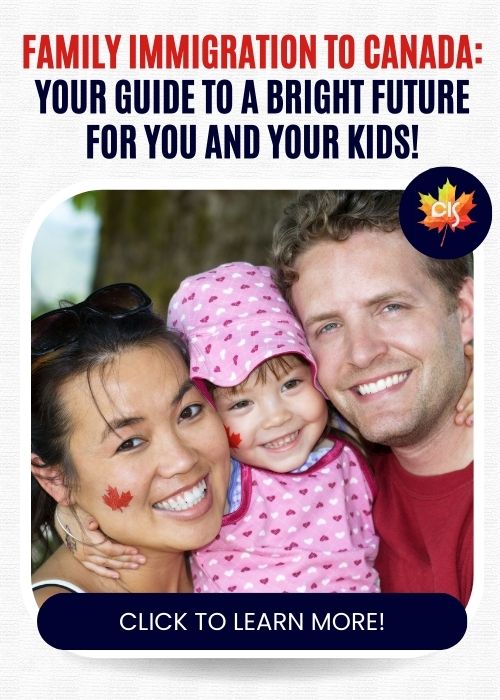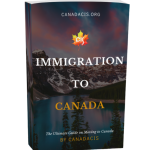Immigration Tips on Reuniting with Family in Canada
Home » Blog » Immigration to Canada » How You Can Reunite with Family in Canada
And the best news is, your family could join them!
CIC news has released the latest immigration status for family reunification, and some members may now have the chance to move to Canada and reunite with their loved ones.
If you have relatives in Canada, you could be exempt from travel restrictions connected to the coronavirus.
You may also be permitted to reunite with family in Canada on a temporary basis.
Immigration, Refugees, and Citizenship Canada (IRCC) has family separation policies in place.
However, certain conditions restrict the ability of foreigners to travel or even see family.
If you’d like to learn more about your eligibility to immigrate to Canada and reunite with your family this year, if it’s even a possibility to immigrate to Canada in 2023, and what steps are needed to start your immigration journey, continue reading this article!
Table of Contents
👨👩👧👧 Reunite with Family in Canada in 2024
Now that you know that reuniting with family in Canada this year is possible, it’s best to know what you should expect before you pack your bags. Any traveler entering Canada who is not involved in essential travel must comply with coronavirus-related public health precautions, such as taking a negative COVID-19 test when you reach the border and self-quarantine for 14 days before visiting family.
People who provide compassionate reasons (severe illness or death in the family) will be given some leniency. Otherwise, border officials will expect you to have a quarantine plan in place. In addition, you will need to provide and state the exact details of where you’re staying, as well as what you’ll need to get, such as meals, groceries, and medications.
While you wait for your COVID-19 test results, you must remain in a government-approved hotel. We’re talking about an estimated duration of between one and three days, and costs are non-refundable. So prepare yourself for a lengthy but worthwhile process to reunite with family in Canada.
🏘️ Guide on Canada Family Visa Procedure
If you plan to apply for a family visa, this can be done in 2 ways:
- Your spouse, or immediate family member must apply to become a sponsor
- You must apply for permanent residency.
Once you have applied for both, you will have to send the sponsorship and permanent residency applications at the same time.
Steps for Sponsor
- Check if they’re eligible to sponsor before you apply
- Fill out the sponsorship application
- List all of your family members
- Agree that all the information on your application is true
Steps for Sponsee
- Fill out your immigration application
- Scan and upload the documents
- Pay the application fees, this includes your biometrics fees, third-party fees, and medical exam, police clearance)
- Submit your complete application
- Check your application status
🍁 How Can a Family Move to Canada?
A family can move to Canada through The Family Class Sponsorship Program.
Family Sponsorship allows citizens and permanent residents of Canada can sponsor their relatives to come to Canada on a permanent basis through this program. To qualify for sponsorship your relative must be a Canadian citizen or permanent resident and considered as an immediate family member.
Which Family Members Are Eligible for Family Reunification?
As mentioned, only an immediate family member is eligible for family reunification in Canada.
A member of the immediate family is defined as a:
- Husband, wife, or common-law partner
- Dependent child of a dependent child
- Parent or step-parent
☑️ Requirements for Family Sponsorship in Canada
There are several requirements you and your sponsor will need to take into consideration in order to be eligible for the family sponsorship program, these requirements include:
Your sponsor should be 18 years of age or older, be a Canadian citizen, registered Indian, or permanent resident, and living in Canada
You and your sponsor must indicate that you will make every effort to support yourself.
Your sponsor must also promise in writing to assist your family for a certain period of time (3 to 20 years)
Include all dependent children (if any) of your relative on your relative’s application and all papers required in the document checklist
Every piece of information in your application must be truthful, accurate, and complete
You must get approval and submit the appropriate forms with your application
🗂️ Documents for Canadian Sponsorship Visa
When submitting Canadian Sponsorship Visa applications, you must gather and attach the following documents:
IRCC-mandated immigration forms
Proof of Identity
Proof of sponsor’s Canadian citizenship
Proof of relationship to the sponsor
Additional family papers and information
Police clearance certification
💍 Reuniting with Your Canadian Citizen Spouse
There’s no better feeling than finally being together at last with your special someone in Canada! Getting to Canada and living a better life with the one you love may seem like a challenge, but never impossible.
For your Canadian citizen or permanent resident spouse to sponsor you, here’s what you have to know:
You must match the following criteria:
- Are at least eighteen years of age
- Are a permanent resident/citizen of Canada
- Are capable and willing to care of your basic financial requirements for at least three years
If you wish to sponsoring your husband or wife, immigration officers will expect to see the following evidence:
- Relationship Information and Sponsorship
- Evaluation Form
- Marriage certificate
- Wedding invitations and photos
- Birth certificates or adoption records for any children you and your spouse have together
- Proof of registration of marriage with a government authority
You need at least two of the following documents:
- Evidence showing you and your spouse jointly possess property
- Joint bank accounts
- Utility invoices with your and your spouse’s names
- Copies of government-issued IDs
- Automobile insurance
- Pay stubs or tax returns demonstrating that you and your spouse live at the same address
According to the published spousal sponsorship processing times, the IRCC processes spousal sponsorship applications in roughly 12 months, including a two- or three-month waiting period during which the sponsorship application is reviewed.
👨👩👦👦 Moving to Canada With A Children
In Canada, the well-being of families, including newcomers, is a priority. The Canada Child Benefit (CCB) is a financial support program offered by the Canadian government to assist eligible families with the cost of raising children, including immigrants.
The amount of the Canada Child Benefit is determined based on various factors, including family income, the number of children, and their ages. It is designed to provide more significant support to low and middle-income families.
Now, if you are just planning to immigrate to Canada and get the benefits of having children as an immigrant, click the photo to know the process of moving to Canada with your family!
🛫 Exemptions from Coronavirus-related Travel Restrictions
To travel to Canada as a foreigner you must match one of the following requirements:
For eligible immediate family, they must strictly follow these Canadian protocols:
- You must stay in Canada for at least 15 days
- You must have a quarantine plan outlining how you will quarantine for 14 days upon arrival in Canada. This is strictly required.
- Immediate family members staying fewer than 15 days must be on a non-discretionary trip.
Reuniting with Family During Travel Restrictions
You are not required to get a formal authorization from us confirming your exemption from travel restrictions.
To board an aircraft to Canada, however, it’s required for you to:
- Adhere to all airline standards and pass a health screening done by airline staff to ensure you do not exhibit COVID-19 symptoms such as a fever, a cough, or trouble breathing.
- Anyone exhibiting symptoms will be denied boarding on a trip to Canada.
- Inform the airline that you are not subject to the travel restrictions.
- Ascertain that you have a valid travel document (visitor visa or electronic travel authorization [eTA], if applicable) and a valid passport to enter Canada.
- Provide confirmation that you are an immediate family member of a Canadian citizen, an Indian registered under Canada’s Indian Act, or a permanent resident of Canada.
- Demonstrate that you are eligible to travel within this time period.
You must be able to provide evidence for at least one of the following:
- You’ll spend at least 15 days in Canada.
- You’re on a non-discretionary trip.
- Documents that prove your relationship to an immediate family member
You must have two forms of documentation:
- One that verifies your direct family member’s citizenship, Indian Act registration, or permanent residence status in Canada.
- One that demonstrates your connection to that family member.
- Documents attesting to the individual’s Canadian citizenship, Indian Act status, or permanent resident status in Canada.
Note: Both paper and electronic versions of the documents are acceptable. The materials listed above are just some of the examples. Additional documentation may be requested by an officer if needed.
To reunite with family in Canada may have seemed close to impossible this year but with the new travel restrictions exemptions, we are looking forward to seeing more families finally getting the chance to be happily together with their family in “The Great White North”.







